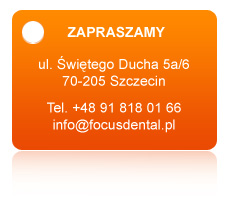
FAQ
Dental implants have been available for over 40 years. Since then not a single case of allergy caused by titan implants have been reported. Titan does not contain any substances which could cause allergy and is neutral to the human organism. Of the materials used for crowns and bridges the porcelain ones are the least likely to cause allergy. The risk of allergy increases when metals and plastic are used. Consult your doctor when choosing an implant suiting you best.
For a few days after the surgery the gums will be very sensitive, they won’t bleed though. Slightly swollen cheek may give some discomfort, but most patients don’t need painkillers a day after the surgery and can go back to their daily routines.
Yes, but your illness must be monitored by a doctor. Untreated diabetics can influence healing process. If you have any doubts, consult your doctor.
No. If you have problems with your kidneys, arteries, blood circulation, weak immune system, or you are prone to have hemorrhages, you should always inform your doctor. In same cases the side effects of the medicines used can influence the healing process. Therefore you should inform the doctor about any taken medication, during your first visit. The doctor will be able to recommend the most appropriate treatment.
No matter what prosthetic based on implants you have (crown, bridge, denture), you will be able to bite, eat, talk and smile as before. The prosthetic will be firmly fit to the implant giving you the feeling of comfort and confidence.
It is possible with some medicines. For example cortizon can change metabolism, and influence immune system and therefore cause problems with healing. Anticoagulants can cause hemorrhages during the surgery. If you take any medication you should consult your doctor before the surgery.
Classic dentures should be taken off for the night, because during the sleep they can change position and block pharynx or larynx. Implant based denture is firmly fit and stays on its place also during the night, not causing any danger. Ask your doctor for instructions.
Yes. Nowadays it happens very often. Implant is paced in the fresh wound. It is called immediate placement of the implant (not to be mistaken with immediate charging of the implant).
Standard procedure includes the stage of healing with uncharged implants. In this method a missing tooth after placing the implant is replaced by a classic prosthetic attached to neighbouring teeth. Immediate charging is a new method using modern implantology systems, which, if patient’s jaw has favourable anatomical built, make it possible to put the final prosthetic on the implant. In one day patients get implants and naturally looking teeth. Your doctor will suggest the best option.
When a jaw is toothless and the bone is not charged for a longer time the bone recesses. It is a process similar to the atrophy of unused muscles. A bone may also be damaged by bacteria. This happens in paradontosis. If the bone is enfeebled or to thin, an implant can not be placed in it. Then the dentist will suggest a bone transplant. Bone tissue will be reconstructed from bone material taken from the patient or from artificial bone-creating material. It will be done in as much a painless way as possible. Transplanted material is placed in layers on the bone and gradually transformed into a bone. In this way bone can be widened and lifted. Bone transplant can be done during placing an implant. Sometimes additional surgery is needed.
Yes. A specialist doctor can safely place a few implants during one surgery. It is a painless treatment.
You will probable can a medical leave for a few days. However, as soon as the next day you will be able to return to your daily routines and return to work within a few days.
No. Think of implants as of your own organs. There is no real difference between them and natural teeth.
Informacje o implantach z materiałów Dentsply Friadent.







